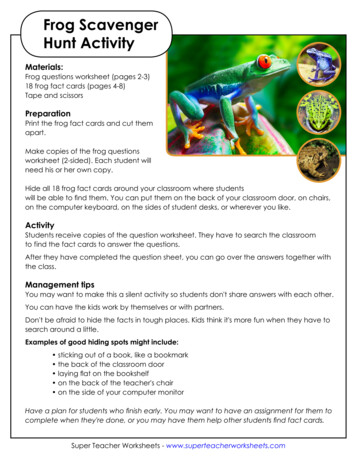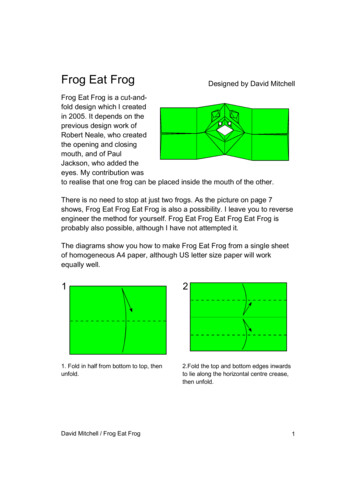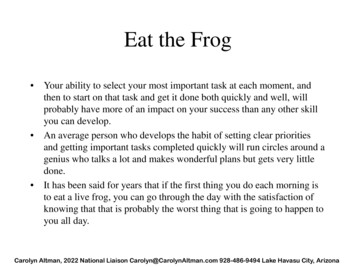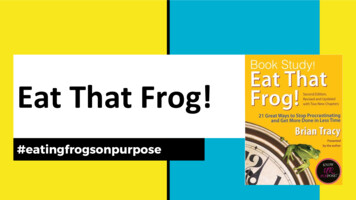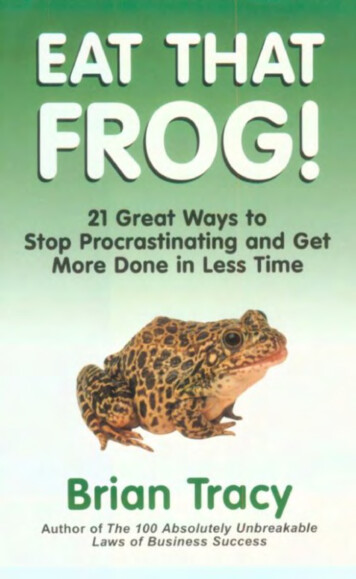
Transcription
ContentsPrefaceIntroductionChapter 1Set the TableChapter 2Plan Every Day In AdvanceChapter 3Apply the 80/20 Rule to EverythingChapter 4Consider the ConsequencesChapter 5Practice the ABCDE Method ContinuallyChapter 6Focus on Key Result AreasChapter 7Obey the Law of Forced EfficiencyChapter 8Prepare Thoroughly Before You BeginChapter 9Do Your HomeworkChapter 10Leverage Your Special TalentsChapter 11Identify Your Key ConstraintsChapter 12Take It One Oil Barrel At A TimeChapter 13Put the Pressure on Yourself1
Chapter 14Maximize Your Personal PowerChapter 15Motivate Yourself Into ActionChapter 16Practice Creative ProcrastinationChapter 17Do the Most Difficult Task FirstChapter 18Slice and Dice the TaskChapter 19Create Large Chunks of TimeChapter 20Develop a Sense of UrgencyChapter 21Single Handle Every TaskPutting It All Together2
PrefaceThank you for picking up this book. I hope these ideashelp you as much as have helped me and thousands ofothers. In fact, I hope that this book changes your lifeforever.There is never enough time to do everything you have todo. You are literally swamped with work and personalresponsibilities, projects, stacks of magazines to read andpiles of books you intend to get to one of these days assoon as you get caught up.But the fact is that you are never going to get caught up.You will never get on top of your tasks. You will neverget far enough ahead to be able to get to all those books,magazines and leisure time activities that you dream ofdoing.And forget about solving your time managementproblems by becoming more productive. No matter howmany personal productivity techniques you master, therewill always be more to do than you can ever accomplishin the time you have available to you, no matter howmuch it is.You can only get control of your time and your life bychanging the way you think, work and deal with the neverending river of responsibilities that flows over you eachday. You can only get control of your tasks and activitiesto the degree that you stop doing some things and startspending more time on the few things that can reallymake a difference in your life.3
I have studied time management for more than thirtyyears. I have immersed myself in the works of PeterDrucker, Alex Mackenzie, Alan Lakein, Stephen Coveyand many, many others. I have read hundreds of booksand thousands of articles on personal efficiency andeffectiveness. This book is the result.Each time I came across a good idea, I tried it out in myown work and personal life. If it worked, I incorporated itinto my talks and seminars and taught it to others.Galileo once wrote, “You cannot teach a personsomething he does not already know; you can only bringwhat he does know to his awareness.”Depending upon your level of knowledge and experience,these ideas will sound familiar. This book will bring themto a higher level of awareness. When you learn and applythese methods and techniques over and over until theybecome habits, you will alter the course of you life in avery positive way.My Own StoryLet me tell you a little about myself the origins of thislittle book.I started off in life with few advantages, aside from acurious mind. I did poorly in school and left withoutgraduating. I worked at laboring jobs for several years.My future did not appear promising.4
As a young man, I got a job on a tramp freighter and wentoff to see the world. For eight years, I traveled andworked, and then traveled some more, eventually visitingmore than eighty countries on five continents.When I could no longer find a laboring job, I got intosales, knocking on doors, working on straightcommission. I struggled from sale to sale until I beganlooking around me and asking, “Why is it that otherpeople are doing better than I am?”Then I did something that changed my life. I went andasked other successful people what they were doing. Andthey told me. And I did what they advised me to do, andmy sales went up. Eventually, I became so successful thatthey made me a sales manager. As a sales manager, I usedthe same strategy. I found out what other successfulmanagers were doing and then did it myself.This process of learning and applying what I had learnedchanged my life. I am still amazed at how simple andobvious it is. Just find out what other successful people doand do the same things until you get the same results.Wow! What an idea.Simply put, some people are doing better than othersbecause they do things differently and they do the rightthings right. Especially, they use their time far, far betterthan the average person.Coming from an unsuccessful background, I haddeveloped deep feelings of inferiority and inadequacy. Ihad fallen into the mental trap of assuming that people5
who were doing better than me were actually better thanme. What I learned was that this was not necessarily true.They were just doing things differently, and what they hadlearned to do, within reason, I could learn as well.This was a revelation to me. I was both amazed andexcited with this discovery. I still am. I realized that Icould change my life and achieve almost any goal I couldset if I just found out what others were doing in that areaand then did it myself until I got the same results theywere getting.Within one year of starting in sales, I was a top salesman.A year after I was made a manager, I was a vice-presidentin charge of a 95 person sales force in six countries. I wastwenty-five years old.Over the years, I have worked in twenty-two differentjobs, started and built several companies, earned abusiness degree from a major university, learned to speakFrench, German and Spanish and been a speaker, traineror consultant for more than 500 companies. I currentlygive talks and seminars to more than 250,000 people eachyear, with audiences as large as 20,000 people.Throughout my career, I have found a simple truth. Theability to concentrate single-mindedly on your mostimportant task, to do it well and to finish it completely, isthe key to great success, achievement, respect, status andhappiness in life. This key insight is the heart and soul ofthis book.6
This book is written to show you how to get ahead morerapidly in your career. These pages contain the twentyone most powerful principles on personal effectiveness Ihave ever discovered.These methods, techniques and strategies are practical,proven and fast acting. In the interests of time, I do notdwell on the various psychological or emotionalexplanations for procrastination or poor timemanagement. There are no lengthy departures into theoryor research. What you will learn are specific actions youcan take immediately to get better, faster results in yourwork.Every idea in this book is focused on increasing youroverall levels of productivity, performance and output, onmaking you more valuable in whatever you do. You canapply many of these ideas to your personal life as well.Each of these twenty-one methods and techniques iscomplete in itself. All are necessary. One strategy mightbe effective in one situation and another might apply toanother task. All together, these twenty-one ideasrepresent a smorgasbord of personal effectivenesstechniques that you can use at any time, in any order orsequence that makes sense to you at the moment.The key to success is action. These principles work tobring about fast, predictable improvements inperformance and results. The faster you learn and applythem, the faster you will move ahead in your career.Guaranteed.7
There will be no limit to what you can accomplish whenyou learn how to “Eat That Frog!”Brian Tracy8
IntroductionThis is a wonderful time to be alive. There have neverbeen more possibilities and opportunities for you toachieve more of your goals than exist today. As perhapsnever before in human history, you are actually drowningin options. In fact, there are so many good things that youcan do that your ability to decide among them maybe thecritical determinant of what you accomplish in life.If you are like most people today, you are overwhelmedwith too much to do and too little time. As you struggle toget caught up, new tasks and responsibilities just keeprolling in, like the tides. Because of this, you will neverbe able to do everything you have to do. You will neverbe caught up. You will always be behind in some of yourtasks and responsibilities, and probably in many of them.For this reason, and perhaps more than ever before, yourability to select your most important task at each moment,and then to get started on that task and to get it done bothquickly and well, will probably have more of an impacton your success than any other quality or skill you candevelop.An average person who develops the habit of setting clearpriorities and getting important tasks completed quicklywill run circles around a genius who talks a lot and makeswonderful plans but who gets very little done.It has been said for many years that if the first thing youdo each morning is to eat a live frog, you can go throughthe day with the satisfaction of knowing that that is9
probably the worst thing that is going to happen to you allday long.Your "frog" is your biggest, most important task, the oneyou are most likely to procrastinate on if you don't dosomething about it.It is also the one task that can have the greatest positiveimpact on your life and results at the moment.It is also been said that, "If you have to eat two frogs, eatthe ugliest one first."This is another way of saying that, if you have twoimportant tasks before you, start with the biggest, hardestand most important task first. Discipline yourself to beginimmediately and then to persist until the task is completebefore you go on to something else.Think of it as a “test.” Treat it like a personal challenge.Resist the temptation to start with the easier task.Continually remind yourself that one of the mostimportant decisions you make each day is your choice ofwhat you will do immediately and what you will do later,if you do it at all.There is one final observation. "If you have to eat a livefrog, it doesn't pay to sit and look at it for very long."The key to reaching high levels of performance andproductivity is for you to develop the lifelong habit oftackling your major task first thing each morning. Youmust develop the routine of "Eating your frog" before you10
do anything else, and without taking too much time tothink about it.In study after study of men and women who get paidmore and promoted faster, the quality of "actionorientation," stands out as the most observable andconsistent behavior they demonstrate in everything theydo. Successful, effective people are those who launchdirectly into their major tasks and then disciplinethemselves to work steadily and single mindedly untilthose tasks are complete.In our world, and especially in our business world, youare paid and promoted for getting specific, measurableresults. You are paid for making a valuable contributionand especially, for making the contribution that isexpected of you."Failure to execute" is one of the biggest problems inorganizations today. Many people confuse activity withaccomplishment. They talk continually, hold endlessmeetings and make wonderful plans, but, in the finalanalysis, no one does the job and gets the results required.Fully 95% of your success in life and work will bedetermined by the kind of habits that you develop overtime. The habit of setting priorities, overcomingprocrastination and getting on with your most importanttask is a mental and physical skill. As such, this habit islearnable through practice and repetition, over and overagain, until it locks into your subconscious mind andbecomes a permanent part of your behavior. Once itbecomes a habit, it becomes both automatic and easy todo.11
You are designed mentally and emotionally in such a waythat task completion gives you a positive feeling. It makesyou happy. It makes you feel like a winner.Whenever you complete a task, of any size or importance,you feel a surge of energy, enthusiasm and self-esteem.The more important the completed task, the happier, moreconfident and powerful you feel about yourself and yourworld.Important task completion triggers the release ofendorphins in your brain. These endorphins give you anatural “high.” The endorphin rush that followssuccessful completion of any task makes you feel morecreative and confident.Here is one of the most important of the so-called “secretsof success.” It is that you can actually develop a "positiveaddition" to endorphins and to the feeling of enhancedclarity, confidence and competence that they trigger.When you develop this “addiction,” almost withoutthinking you begin to organize your life in such a waythat you are continually starting and completing evermore important tasks and projects. You actually becomeaddicted, in a very positive sense, to success andcontribution.One of the keys to your living a wonderful life, having asuccessful career and feeling terrific about yourself is foryou to develop the habit of starting and finishingimportant jobs. At that point, this behavior takes on apower of its own and you find it easier to completeimportant tasks than not to complete them.12
You remember the story of the man who stops themusician on the street of New York and asks how he canget to Carnegie Hall. The musician replies, "Practice,man, practice."Practice is the key to mastering any skill. Fortunately,your mind is like a muscle. It grows stronger and morecapable with use. With practice, you can learn anybehavior or develop any habit that you consider eitherdesirable or necessary.You need three key qualities to develop the habits offocus and concentration. They are all learnable. They aredecision, discipline and determination.First, make a decision to develop the habit of taskcompletion. Second, discipline yourself to practice theprinciples you are about to learn over and over until youmaster them. And finally, back everything you do withdetermination until the habit is locked in and becomes apermanent part of your personality.There is a special way that you can accelerate yourprogress toward becoming the highly productive,effective, efficient person that you want to be. It consistsof your thinking continually about the rewards andbenefits of being an action oriented, fast moving, focusedperson. See yourself as the kind of person who getsimportant jobs done quickly and well on a consistentbasis.Your mental picture of yourself has a powerful effect onyour behavior. Visualize yourself as the person you intend13
to be in the future. Your self-image, the way you seeyourself on the inside, largely determines yourperformance on the outside. As professional speaker JimCathcart says, “The person you see is the person you willbe.”You have a virtually unlimited ability to learn anddevelop new skills, habits and abilities. When you trainyourself, through repetition and practice, to overcomeprocrastination and get your most important taskscompleted quickly, you will move yourself onto the fasttrack in your life and career and step on the accelerator.Eat That Frog!14
Chapter 1 - Set the Table“There is one quality that one must possess to win, andthat is definiteness of purpose, the knowledge of what onewants and a burning desire to achieve it.” ( NapoleonHill )Before you can determine your “frog” and get on witheating it, you have to decide exactly what it is you want toaccomplish in each area of your life. Clarity is the mostimportant concept in personal productivity. The numberone reason why some people get more work done faster isbecause they are absolutely clear about their goals andobjectives and they don’t deviate from them.The more clear you are about what you want and whatyou have to do to achieve it, the easier it is for you toovercome procrastination, eat your frog and get on withthe completion of the task.A major reason for procrastination and lack of motivationis vagueness, confusion and fuzzy mindedness about whatit is you are supposed to do, and in what order and forwhat reason. You must avoid this common condition withall your strength by striving for ever greater clarity ineverything you do.Here is a great rule for success: "Think on paper."Only about 3% of adults have clear, written goals. Thesepeople accomplish five and ten times as much as peopleof equal or better education and ability but who, for15
whatever reason, have never taken the time to write outexactly what it is they want.There is a powerful formula for setting and achievinggoals that you can use for the rest of your life. It consistsof seven simple steps. Any one of these steps can doubleand triple your productivity if you are not currently usingit. Many of my graduates have increased their incomesdramatically in a matter of a few years, or even a fewmonths, with this simple, seven-part method.Step number one: Decide exactly what you want.Either decide for yourself or sit down with your boss anddiscuss your goals and objectives until you are absolutely,crystal clear about what is expected of you and in whatorder of priority. It is amazing how many people areworking away, day after day, on low value tasks becausethey have not had this critical discussion with theirmanager.Rule: “One of the very worst uses of time is to dosomething very well that need not be done at all.”Stephen Covey says that, "Before you begin scramblingup the ladder of success, make sure that it is leaningagainst the right building."Step number two: Write it down.Think on paper. When you write your goal down, youcrystallize it and give it tangible form. You createsomething that you can touch and see. On the other hand,16
a goal or objective that is not in writing is merely a wishor a fantasy. It has no energy behind it. Unwritten goalslead to confusion, vagueness, misdirection and numerousmistakes.Step number three: Set a deadline on your goal.A goal or decision without a deadline has no urgency. Ithas no real beginning or end. Without a definite deadlineaccompanied by the assignment or acceptance of specificresponsibilities for completion, you will naturallyprocrastinate and get very little done.Step number four: Make a list of everything that you canthink of that you are going to have to do to achieve yourgoal.As you think of new activities, add them to your list.Keep building your list until it is complete. A list givesyou a visual picture of the larger task or objective. It givesyou a track to run on. It dramatically increases thelikelihood that you will achieve your goal as you havedefined it and on schedule.Step number five: Organize the list into a plan.Organize your list by priority and sequence. Take a fewminutes to decide what you need to do first and what youcan do later. Decide what has to be done beforesomething else and what needs to be done afterwards.Even better, lay out your plan visually, in the form of aseries of boxes and circles on a sheet of paper. You’ll be17
amazed at how much easier it is to achieve your goalwhen you break it down into individual tasks.With a written goal and an organized plan of action, youwill be far more productive and efficient than someonewho is carrying his goals around in his mind.Step number six: Take action on your plan immediately.Do something. Do anything. An average plan vigorouslyexecuted is far better than a brilliant plan on whichnothing is done. For you to achieve any kind of success,execution is everything.Step number seven: Resolve to do something every singleday that moves you toward your major goal.Build this activity into your daily schedule. Read aspecific number of pages on a key subject. Call on aspecific number of prospects or customers. Engage in aspecific period of physical exercise. Learn a certainnumber of new words in a foreign language. Never miss aday.Keep pushing forward. Once you start moving, keepmoving. Don’t stop. This decision, this discipline alone,can make you one of the most productive and successfulpeople of your generation.Clear written goals have a wonderful effect on yourthinking. They motivate you and galvanize you intoaction. They stimulate your creativity, release your energy18
and help you to overcome procrastination as much as anyother factor.Goals are the fuel in the furnace of achievement. Thebigger your goals and the clearer they are, the moreexcited you become about achieving them. The more youthink about your goals, the greater becomes your innerdrive and desire to accomplish them.Think about your goals and review them daily. Everymorning when you begin, take action on the mostimportant task you can accomplish to achieve your mostimportant goal at the moment.Eat That Frog! Take a clean sheet of paper right now andmake out a list of ten goals you want to accomplish in thenext year. Write your goals as though a year has alreadypassed and they are now a reality.Use the present tense, positive and personal case so thatthey are immediately accepted by your subconsciousmind.For example, you would write. “I earn X number ofdollars per year.” Or “I weigh X number of pounds.” Or“I drive such and such a car.”Then, go back over your list of ten goals and select theone goal that, if you achieved it, would have the greatestpositive impact on your life. Whatever that goal is, writeit on a separate sheet of paper, set a deadline, make aplan, take action on your plan and then do something19
every single day that moves you toward that goal. Thisexercise alone could change your life!20
Chapter 2 – Plan Every Day InAdvance“Planning is bringing the future into the present so youcan do something about it now.” (Alan Lakein)You have heard the old question, ”How do you eat anelephant? One bite at a time!”How do you eat your biggest, ugliest frog? The sameway; you break it down into specific step-by-stepactivities and then you start on the first one.Your mind, your ability to think, plan and decide, is yourmost powerful tool for overcoming procrastination andincreasing your productivity. Your ability to set yourgoals, plan and take action on them determines the courseof your life. The very act of thinking and planningunlocks your mental powers, triggers your creativity andincreases your mental and physical energies.Conversely, as Alex MacKenzie wrote, "Action withoutplanning is the cause of every failure."Your ability to plan well, in advance of beginning, is ameasure of your overall competence. The better the planyou have, the easier it is for you to overcomeprocrastination, to get started , to eat your frog and then tokeep going.One of your top goals at work should be for you to get thehighest possible return on your investment of mental,21
emotional and physical energy. The good news is thatevery minute spent in planning saves as many as tenminutes in execution. It only takes about ten or twelveminutes for you to plan out your day, but this smallinvestment of time will save you at least two hours (100120 minutes) in wasted time and diffused effortthroughout the day.You may have heard of the six "P" formula. It says,"Proper Prior Planning Prevents Poor Performance."When you consider how helpful planning can be inincreasing your productivity and performance, it isamazing how few people practice it every single day. Andplanning is really quite simple to do. All you need is apiece of paper and a pen. The most sophisticated PalmPilot, computer program or time planner is based on thesame principle. It is based on your sitting down andmaking a list of everything you have to do before youbegin.Always work from a list. When something new comes up,add it to the list before you do it. You can increase yourproductivity and output by 25% or more from the first daythat you begin working consistently from a list.Make out your list the night before, at the end of theworkday. Move everything that you have not yetaccomplished onto your list for the coming day and thenadd everything that you have to do the next day. Whenyou make out your list the evening or the night before,your subconscious mind works on your list all night longwhile you sleep. Often you will wake up with great ideas22
and insights that you can use to get your job done fasterand better than you had initially thought.The more time you take to make written lists ofeverything you have to do, in advance, the more effectiveand efficient you will be.There are different lists that you need for differentpurposes. First, you should create a master list on whichyou write down everything you can think of that you wantto do some time in the future. This is the place where youcapture every idea that comes to or every new task orresponsibility that comes up. You can then sort out theitems later.Second, you should have a monthly list that you make upat the end of the month for the month ahead. This maycontain items transferred from your master list.Third, you should have a weekly list where you plan yourentire week in advance. This is a list that is underconstruction as you go through the current week.This discipline of systematic time planning can be veryhelpful to you. Many people have told me that the habit oftaking a couple of hours at the end of each week to planthe coming week has increased their productivitydramatically and changed their lives completely. Thistechnique will work for you as well.Finally, you transfer items from your monthly and weeklylists onto your daily list. These are the specific activitiesthat you are going to accomplish that day.23
As you work through the day, tick off the items on yourlist as you complete them. This activity gives you a visualpicture of accomplishment. It generates a feeling ofsuccess and forward motion. Seeing yourself workingprogressively through your list motivates and energizesyou. It raises your self-esteem and self-respect. Steady,visible progress propels you forward and helps you toovercome procrastination.When you have a project of any kind, begin by making alist of every step that you will have to complete to finishthe project from beginning to end. Organize the project bypriority and sequence. Lay it out in front of you on paperor on a computer so that you can see it. Then go to workon one task at a time. You will be amazed at how muchyou get done in this way.As you work through your lists, you will feel more andmore effective and powerful. You will feel more incontrol of your life. You will be naturally motivated to doeven more. You will think better and more creatively andyou will get more and better insights that enable you to doyour work even faster.As you work steadily through your lists, you will developa sense of positive forward momentum that enables you toovercome procrastination. This feeling of progress givesyou more energy and keeps you going throughout the day.One of the most important rules of personal effectivenessis the 10/90 Rule. This rule says that the first 10% of timethat you spend planning and organizing your work, beforeyou begin, will save you as much as 90% of the time in24
getting the job done once you get started. You only haveto try this rule once to prove it to yourself.When you plan each day in advance, you find it mucheasier to get going and to keep going. The work goesfaster and smoother than ever before. You feel morepowerful and competent. You eventually becomeunstoppable.Eat That Frog! Begin today to plan every day, week andmonth in advance. Take a notepad or sheet of paper andmake a list of everything you have to do in the next 24hours. Add to it as new items come up. Make a list of allyour projects, the big multi-task jobs that are important toyour future.Lay out each of your major goals, projects or tasks bypriority, what is most important, and by sequence, whathas to be done first, what comes second and so forth.Start with the end in mind and work backward.Think on paper! Always work from a list. You‟ll beamazed at how much more productive you become, andhow much easier it is to eat your frog.25
Chapter 3 - Apply the 80/20 Rule toEverything“We always have time enough, if we will but use itaright.” (Wolfgang Von Goethe)The 80/20 Rule is one of the most helpful of all conceptsof time and life management. It is also called the ParetoPrinciple after its founder, the Italian economist VilfredoPareto, who first wrote about it in 1895. Pareto noticedthat people in his society seemed to divide naturally intowhat he called the "vital few,” the top 20% in terms ofmoney and influence, and the “trivial many,” the bottom80%.He later discovered that virtually all economic activitywas subject to this Pareto Principle as well.For example, this rule says that 20% of your activitieswill account for 80% of your results. 20% of yourcustomers will account for 80% of your sales. 20% ofyour products or services will account for 80% of yourprofits. 20% of your tasks will account for 80% of thevalue of what you do, and so on.This means that if you have a list of ten items to do, twoof those items will turn out to be worth as much or morethan the other eight items put together.Here is an interesting discovery. Each of these tasks maytake the same amount of time to accomplish. But one or26
two of those tasks will contribute five or ten times thevalue as any of the others.Often, one item on a list of ten things that you have to docan be worth more than all the other nine items puttogether. This task is invariably the frog that you shouldeat first.Can you guess on which items the average person is mostlikely to procrastinate? The sad fact is that most peopleprocrastinate on the top ten or twenty percent of itemsthat are the most valuable and important, the “vital few.”They busy themselves instead with the least important80%, the "trivial many" that contribute very little toresults.You often see people who appear to be busy all day longbut they seem to accomplish very little. This is almostalways because they are busy doing th
do each morning is to eat a live frog, you can go through the day with the satisfaction of knowing that that is . 10 probably the worst thing that is going to happen to you all day long. Your "frog" is your biggest, most important task, the one you are most likely to procrastinate on if you don't do .
